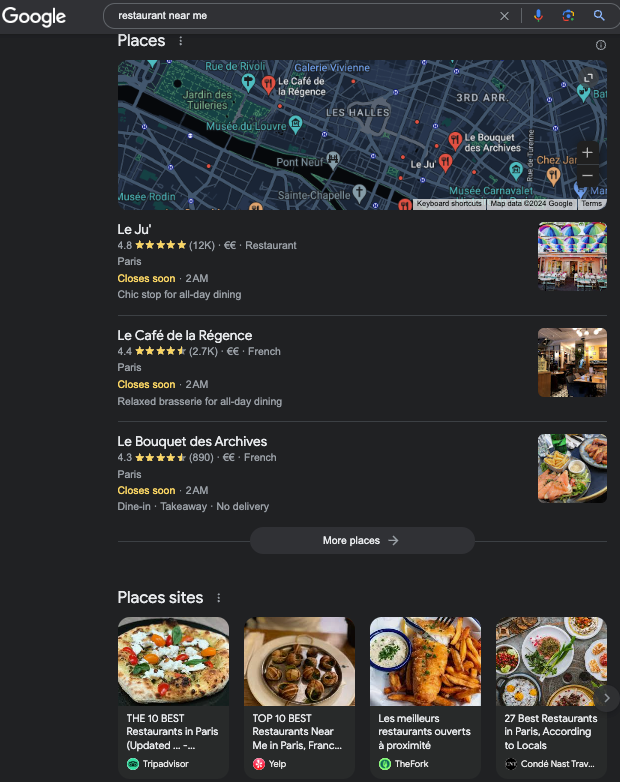Are New Google EU Local Results DMA Compliant?
Google has made various changes to local SERPs to comply with the DMA. But most of them don't really benefit publishers or users.

It has been several weeks since Google introduced new EU local search results to comply with the Digital Markets Act’s Article 6(5). Article 6(5) requires that gatekeepers not treat their own products “more favourably, in ranking and related indexing and crawling, services and products offered by the gatekeeper itself than similar services or products of a third party” and that gatekeepers “apply transparent, fair and non-discriminatory conditions to such ranking.” Google tends to change search results in response to user inputs so I was curious if what we're seeing last week is still holding true.
There are numerous subtle and not so subtle changes that don't appear to benefit third parties (publishers, directories).

More and More Mobile Packs
Using NordVPN we took a peak at results for Paris for "free tasting near me." Note several things about the results shared in the video below. Most obvious is that the Places 3-Pack (aka Local Pack) now ranks above "Places Sites."
Places Sites (who brands this stuff?) were the accommodation that Google made to be "non-discriminatory." Last week when we looked, Places Sites were ranked in the top organic spot but now have slipped below the Local Pack. Like all universal results, Google freely re-ranks them based on user interactions and demand. The DMA accommodation was not so big a change as to always position the third party carousel above the Local Pack. This dynamic re-positioning is also happening in restaurant and hotel searches. Note that some of the pages listed in the Places Sites carousel do not include images, putting those directories at a disadvantage amongst the 10 web pages in the carousel.
As you scroll down in mobile results you will also see that a select number of the directories, in the organic results below the pack, have a similar scrolling image carousel. For example, the TripAdvisor result now shows a multi-image carousel.
Even more interesting though is that Google is now including multiple local Places Packs within the search results below the initial Pack result. Unlike the first Pack, these do not include links to the Local Finder but, when a listing is selected, will take you the Google Profile page.
More Desktop Packs Plus Other Annoyances
As you watch the desktop results for "restaurants near me," using our Paris based search, note that the Places Sites highlighting third parties has again been moved below the pack. When a user attempts to scroll over the Map in the Local Pack at the top, instead of scrolling down the page, the Map zooms in a totally non-intuitive way. The user needs to move their cursor to the right of the map to scroll further down the page. This is clearly a test that appears for some queries but has not been fully implemented.
Is It DMA Compliant?
It remains to be seen whether the EU regulatory bodies will find Places Sites an adequate response to the DMA's non-self-preferencing requirement. They are not particularly user friendly, as they are also not that prominent in the results.
If you select the "see more"option you are taken to another purely organic page with no obvious or visual calls to action. Putting additional Local Pack results on the scrolling pages also reduces the likelihood that one of the new displays will be selected. Not seen in the US, this seems to be a passive-aggressive "stick your tongue out" response to EU regulatory oversight – perhaps one that regulators can't do anything about.
Even more egregious passive-aggressive behavior is manifested in Map zooming, when any normal user is just attempting to scroll past the pack. It's like stepping in quicksand; the more you try to get out, the deeper you go. It's totally distracting and annoying.
While there has been a lot of press dismissive of Apple's DMA compliance efforts, it is ironic that little criticism has been directed at Google. Apple's decisions mostly affect third party developers. Google's also affect consumers and not in a good way, and the benefits to third party publishers seem to be totally missing. Any regulator looking on should see Google's "accommodations" as the theatrical dance that they are.

